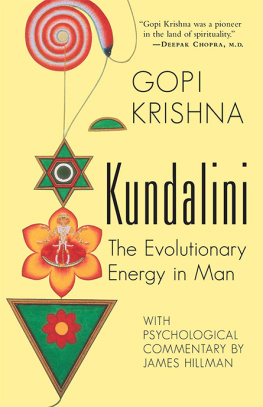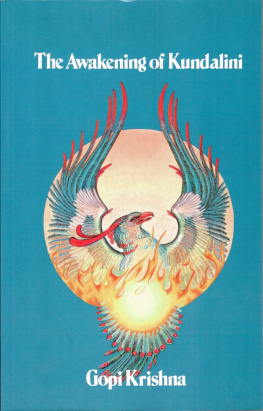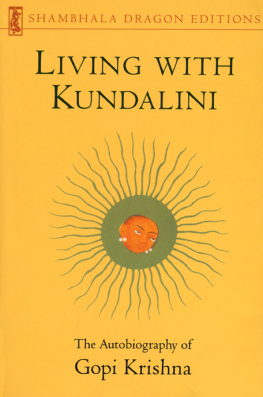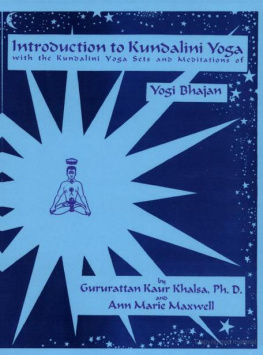Sign up to receive news and special offers from Shambhala Publications.

Or visit us online to sign up at shambhala.com/eshambhala.
Kundalini
The Evolutionary Energy in Man
Gopi Krishna
with a psychological
commentary by James Hillman
foreword by Gene Kieffer

SHAMBHALA
Boulder
2017
Shambhala Publications, Inc.
4720 Walnut Street
Boulder, Colorado 80301
www.shambhala.com
Commentary 1967, 1970 by James Hillman
Foreword 1997 by Gene Kieffer
Book completely revised and reset in 1970
Revised edition 1970 in Great Britain by Vincent Stuart & John M. Watkins Ltd., London
For information about the work and publications of Gopi Krishna, contact The Kundalini Research Foundation, P.O. Box 2248, Darien, CT 06820, U.S.A. In Canada, books by Gopi Krishna may be ordered from F.I.N.D. Research Trust, R.R. 5, Flesherton, Ontario N0C 1E0.
All rights reserved. No part of this book may be reproduced in any form or by any means, electronic or mechanical, including photocopying, recording, or by any information storage and retrieval system, without permission in writing from the publisher.
Library of Congress Cataloging-in-Publication Data
Gopi Krishna, 1903
Kundalini: the evolutionary energy in man / Gopi Krishna; foreword by Gene Kieffer; psychological commentary by James Hillman.
p. cm.
eISBN 9780834824614
ISBN 9781570622809 (alk. paper)
1. Gopi Krishna, 1903 . 2. Kualn. 3. HindusIndiaBiography. I. Title.
BL1175.G62A3 1997 96-9602
294.543dc20 CIP
Foreword
Not een a shadow of the thought
Of Victory should cross your mind,
When with the inner changes wrought
The coiled-up power starts to unwind.
Gopi Krishna, The Way to Self-Knowledge
WHEN this book was first published in 1970, the authors descriptions of his experiences caught everyone by surprise. Nothing in the literature, neither in the ancient texts on Yoga nor in the comparatively recent reports by Western saints and mystics, was remotely similar. They were so at odds with the preconceived ideas at the time that Frederic Spiegelberg, the eminent historian of world religions and professor emeritus of comparative religion and Indology at Stanford University, was moved to write in an introduction to the first edition of the book: We have here, in this wholly unintellectual personality, a classical example of a simple man, uneducated in Yoga, who yet through intense labor and persistent enthusiasm, succeeds in achieving, if not Samadhi, yet some very high state in Yoga perfection, based entirely on his inner feeling development and not at all on ideas and traditions. Gopi Krishna is an extremely honest reporter, to the point of humbleness. Professor Spiegelberg could not have known in 1967 that Pandit Gopi Krishna would go on to write more than a dozen other books, numerous articles, and many thousands of pages of unpublished works, some in verse, some in prose, and almost all in English, over the course of the next decade and a half.
He had decided to begin work on yet another new book when he fell gravely ill with a lung infection. He was still recovering from a previous illness, brought on by fatigue and the intense heat in New Delhi, where he had been staying. When the temperature soared above 115 degrees Fahrenheit, it was decided that he would be more comfortable at his home in Srinagar, Kashmir. His condition improved rapidly, but he developed a lung infection, and within a week or so succumbed. He was awake, resting in the arms of his wife, when he took his last breath. It was on the morning of July 31, 1984, and he was eighty-one years of age.
If this present work leaves the reader with the impression that Gopi Krishna was a frail man, it would be incorrect. Generally speaking, he enjoyed excellent health. But he often said that due to the experiences described herein, his mental and physical condition was such that he had to be extremely careful with his diet and make certain never to overtax his mental strength. He would sometimes remark that his life hung by a slender thread, or that he lived on a razors edge.
Just ten days before his death, he had written in a letter that he believed the earlier crisis had passed and he was rapidly regaining his strength. Soon, he said, he would begin work on yet another book. Many friends had urged him to write more about his inner experiences, and this would fulfill their desire. It was a very upbeat letter, from a man who couldnt wait to get back to work after a debilitating illness.
There were several friends who, early on, wondered why Gopi Krishna didnt just invent something new, discover a cure for cancer, or work a miracle or two, in order to impress the public and win support for his research. His response to such suggestions was to remind them that there wasnt a single mention of miracles in the Upanishadsthe fountainhead of all metaphysical and spiritual thought in Indianor in the dialogues of Buddha. In fact, there isnt a word in favor of miracles in the dialogues of Buddha, he said, nor in the Bhagavad Gita, or the sayings of Ramakrishna, or of Ramana Maharshi.
In a conversation he once said that when he sometimes had visions they were more real, more solid, than the coffee table standing in front of him, which he struck with his hand to emphasize the point. He explained that the ecstatic trance could be of two kinds, one visionary, the other without form. The reason he refrained from describing his visionsexcept for what he has written here, and in The Riddle of Consciousnesswas that they would seem too fantastic to believe. So the book that he had in mind to write just before he passed away might have turned out to be sensational.
Perhaps he felt that it was time for such a book. He had always maintained that his mission was to convince scientists to investigate Kundalini. Writing about his visionary experiences might have lessened his credibility. There would be plenty of fantastic discoveries in the mind and consciousnessand in physiology, alsoonce empirical research was seriously under way.
One of the scientists who was greatly interested in this research was Carl Fredrich von Weizscker, the astrophysicist and author, who had his own Max Planck Institute for the Life Sciences in Starnberg, Germany. Professor Weizscker had visited Gopi Krishna in Kashmir on three occasions and wrote an introduction to a small book the Pandit had written in 1970, entitled The Biological Basis of Religion and Genius (New York: Harper & Row, 1972). In the introduction, Professor Weizscker showed that Gopi Krishnas views about the physiological basis of Kundalini were entirely compatible with modern quantum physics.
Probably almost everyone familiar with the concept of Kundalini agreed with the Pandit that Kundalini would be the target of intense investigation sooner or later. But he was infused with a feeling of urgency that could only be compared to what we know about the Old Testament prophets. This was the result of a book he had written in verse in 1967, entitled The Shape of Events to Come, reflecting the tensions of the Cold War. His main preoccupation ever since was the worlds rapidly expanding arsenals of nuclear weapons.
A pragmatist as well as an enlightened visionary, he thought as far back as the 1970s that serious research on Kundalini would not get under way before the decade of the 1990s. But in a world in which writers routinely go on tours to promote their books on radio and television, and sign autographs in bookstores, he lived quietly with his wife, Bhabi, in their home in Srinagar. In the winter months, they would move in with their eldest son, Jagdish, and his family in New Delhi, because it got much too cold in Kashmir, where few if any homes had central heating.
Next page











